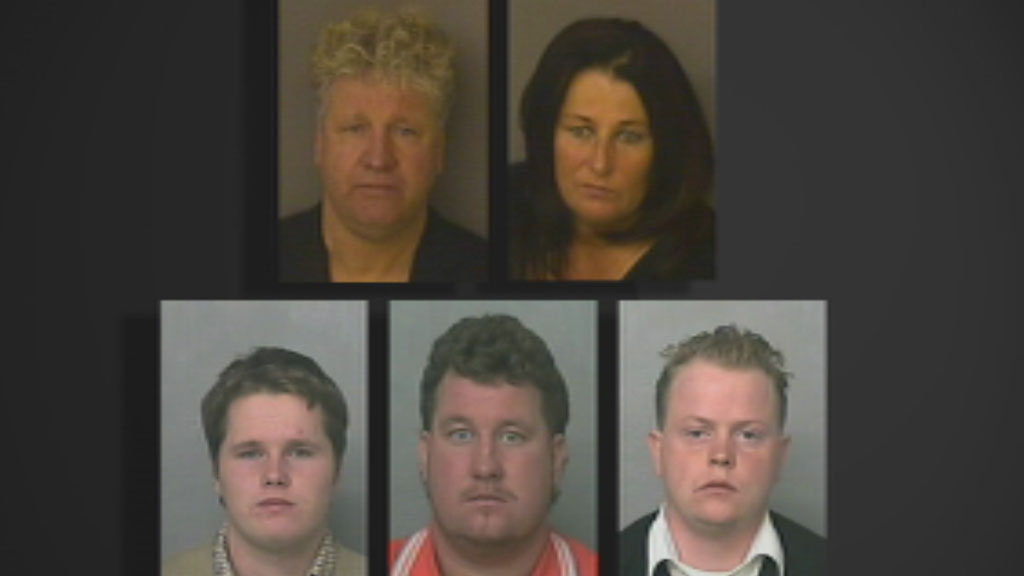Travellers convicted in homeless forced labour case
Five members of a traveller family are found guilty of using homeless men and addicts as forced labourers.

Bristol crown court heard how the Connors family would pick up vulnerable men to work for them as labourers then force them to live in squalid caravans on traveller sites as they moved around the country working on their paving and patio businesses.
William Connors, 52, his wife Mary, 48, their sons John, 29, and James, 20, and son-in-law Miles Connors, 24, were all convicted of conspiracy to require a person to perform forced or compulsory labour.
The men were made to perform humiliating tasks, such as emptying the buckets used as toilets by their bosses, and were controlled by discipline and violence. Some had worked for the family for nearly two decades.
The court heard that the men were beaten, hit with broom handles, belts, a rake and shovel, and punched and kicked by the Connors. On one occasion a worker had a hosepipe shoved down his throat and the men were often made to strip for a “hosing down session” with freezing water.
“It caused fear in the men,” said prosecutor Christopher Quinlan QC.
“Not just themselves being assaulted, but to see the others – if you see one of your colleagues being beaten, you knew what to expect.
“It was a clear and unequivocal demonstration of control and dominance, of one set, the family, over another.
The men were paid as little as £5 for a day’s hard labour that earned the family thousands of pounds. They were given so little food they resorted to scavenging from dustbins at supermarkets for food as well as salvaging clothing from bins and using a bucket as a toilet.
Police began investigating the family after discovering the body of worker Christopher Nicholls, 40. Nicholls was involved in a serious road accident in October 2004 and his body was discovered in a garden shed near the caravan site in May 2008.
In 2009 an unnamed worker contacted the police to say William and Mary Connors had recruited him from the streets of Cheltenham. He told detectives he had his identity documents taken from him and he was rarely paid and received little food.
A number of workers left but were often rounded up and brought back. The Connors claimed the men were able to come and go as they pleased and suggested they had acted as “good Samaritans’ providing them with food, work and accommodation.
The Connors were placed under covert surveillance in August 2010 and police found evidence of men being assaulted. They raided sites in Staverton, Enderby and Mansfield in March 2011 and 19 men were rescued.
Living in luxury
The family profited from the hard labour and lived in large caravans fitted with top of the range kitchens and flat screen televisions. William and Mary enjoyed luxurious holidays to Dubai and a 10-day Caribbean cruise.
They drove cars cars, including a silver A-Class Mercedes saloon, a Rolls Royce, a red Mini convertible, a Toyota Hilux pick-up, a Ford Ranger and a Mercedes van, and had built up a property portfolio potentially worth millions of pounds.
The family bought two caravan parks in Gloucestershire for £545,000 more than a decade ago and had over £500,000 between them in bank accounts. Several houses – including one with a hot tub and flat screen TV – were registered in the names of relatives.
Mr Quinlan told the jury during the trial: “The defendants benefited financially and we say handsomely in their legal exploits and enterprise.
“The men were forced to work and exploited for financial gain and the defendants had a very cheap labour workforce for their businesses.”
William Connors was married to Mary for over 30 years and they had six children together – four daughters and two boys. He was described by workers as the “drill sergeant”.
Mary Connors was identified as the “banker” collecting the money from the workers’ state benefits.
-
Latest news
-
Taylor Swift’s new break-up album breaks records3m

-
NHS trust fined £200K for failings that led to death of two mental health patients3m

-
Sunak vows to end UK ‘sick note culture’ with benefit reform3m

-
‘Loose talk about using nuclear weapons is irresponsible and unacceptable’, says head of UN’s nuclear watchdog3m

-
‘There wasn’t an Israeli attack on Iran,’ says former adviser to Iran’s nuclear negotiations team7m

-




